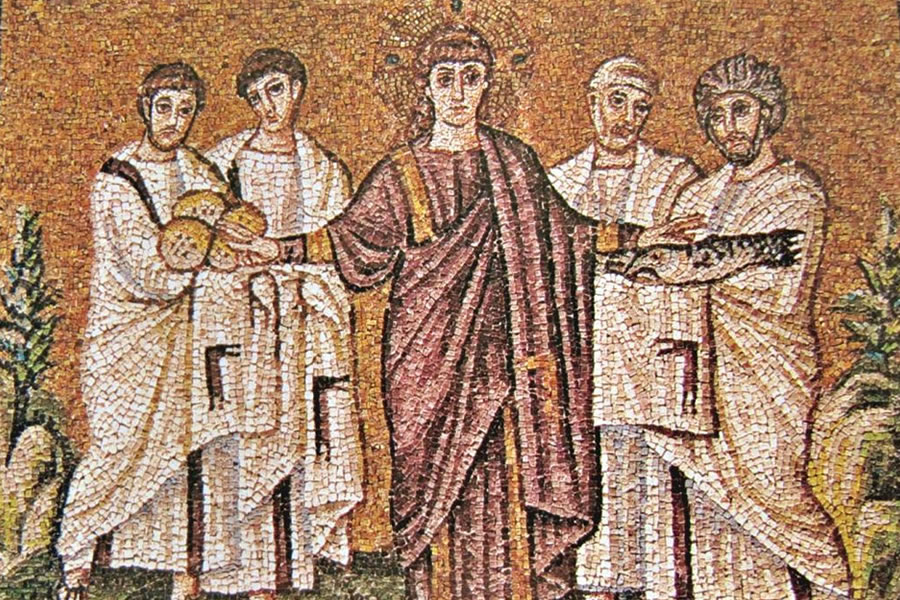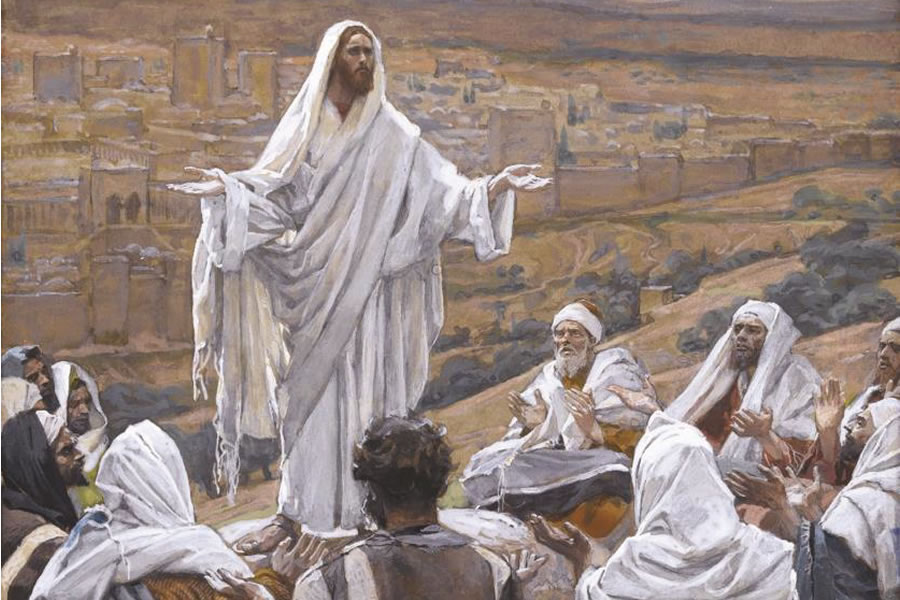St. Francis of Assisi Weekly Reflections

Feeding Thousands
07-28-2024Weekly ReflectionWe Celebrate Worship Resource, Vol. 49, No. 1All four evangelists tell the story of the five loaves and two fish, but John adds a detail at the end of this account that the others don’t. He writes, “When the people saw the sign he had done, they said, “This is truly the Prophet, the one who is to come into the world” (John 6:14). First, note that John refers to Jesus’ miracles as signs, for they lead people to believe in him. Indeed, Jesus truly was the one they anticipated: The Messiah, the Christ. But John goes on to say that Jesus realized that the crowd would “carry him off to make him king,” which is not the kind of Messiah he was (6:15). They believed, but they did not understand. In the coming weeks we will hear Jesus refer to himself as the bread of life and explain that he gives himself to everyone who comes to him and that they will never hunger again. But for today, he takes five loaves of bread, gives thanks, and fills the hungry bellies of thousands, with bread left over for many more (twelve symbolizing every tribe of Israel). For them and for us, the miracle is a sign of God’s overflowing generosity, ensuring that we all are fed.
How can you help to see that many are fed, in imitation of Jesus?
Alimentando A Miles
Los cuatro evangelistas cuentan la historia de los cinco panes y los dos peces, pero Juan agrega un detalle al final de este relato que los demás no agregan. Él escribe: “Cuando la gente vio la señal que había hecho, dijeron: “Éste es verdaderamente el Profeta, el que ha de venir al mundo” (Juan 6:14). Primero, observe que Juan se refiere a los milagros de Jesús como señales, porque llevan a la gente a creer en él. De hecho, Jesús verdaderamente era el que esperaban: el Mesías, el Cristo. Pero Juan continúa diciendo que Jesús se dio cuenta de que la multitud “se lo llevaría para hacerlo rey”, que no es la clase de Mesías que él era (6:15). Creyeron, pero no entendieron. En las próximas semanas escucharemos a Jesús referirse a sí mismo como el pan de vida y explicar que se entrega a todo aquel que viene a él y que nunca más volverá a tener hambre. Pero por hoy, toma cinco panes, da gracias y llena los estómagos hambrientos de miles, con pan sobrante para muchos más (doce simbolizan cada tribu de Israel). Para ellos y para nosotros, el milagro es un signo de la generosidad desbordante de Dios, que garantiza que todos estemos alimentados.
¿Cómo puedes ayudar a que muchos sean alimentados, a imitación de Jesús?

Like Sheep without a Shepherd
07-21-2024Weekly ReflectionWe Celebrate Worship Resource, Vol. 49, No. 1It is no accident that sheep are mentioned in the Bible so often. Domesticated in ancient times, they played a central role in the life of village or rural area, as they were a primary source of food and clothing. Shepherds cared for them, seeing to it that they were safe and well fed. So it makes sense for Jesus to speak of sheep and shepherds, just as Old Testament figures had done. When Jesus sees a crowd of people moving as one to the opposite side of the lake, he visualizes a flock of sheep moving to a verdant pasture. Realizing that they had no one to guide them, his heart is moved with compassion, and he steps in to shepherd them. Though he had planned to rest a while with his disciples, and in fact may not know any of them personally. But they need him, much as we do even today. We can trust that Jesus is always available to teach us, guide us, to care for us. Like sheep who are loved and cared for, we can depend on our shepherd.
How does Jesus guide you and care for you like a shepherd?
Como Ovejas Sin Pastor
No es casualidad que las ovejas se mencionen con tanta frecuencia en la Biblia. Domesticados en la antigüedad, desempeñaban un papel central en la vida de las aldeas o zonas rurales, ya que eran una fuente primaria de alimento y vestido. Los pastores las cuidaban, asegurándose de que estuvieran seguras y bien alimentadas. Por eso tiene sentido que Jesús hable de ovejas y pastores, tal como lo habían hecho los personajes del Antiguo Testamento. Cuando Jesús ve una multitud de personas moviéndose al unísono hacia el lado opuesto del lago, visualiza un rebaño de ovejas moviéndose hacia un pasto verde. Al darse cuenta de que no tenían a nadie que los guiara, su corazón se conmueve con compasión y interviene para pastorearlos. Aunque había planeado descansar un rato con sus discípulos y, de hecho, es posible que no conozca a ninguno de ellos personalmente. Pero lo necesitan, tanto como lo necesitamos nosotros incluso hoy. Podemos confiar en que Jesús siempre está disponible para enseñarnos, guiarnos y cuidar de nosotros. Como ovejas amadas y cuidadas, podemos depender de nuestro pastor.
Come Away And Rest
07-21-2024Question of the WeekReading I: Jeremiah 23:1-6 - Messianic Reign
Reading II: Ephesians 2:13-18 - All United in Christ
Gospel: Mark 6:30-34 - Return of the Disciples
Key Passage: The apostles gathered around Jesus, and told him all that they had done and taught. He said to them, “Come away to a deserted place all by yourselves and rest a while.” (Mark 6:30–31a)
Adults: What do you do to rest so that you can return to work refreshed?
Kids: When will you take Ɵme to stop and pray this week?
Ven Y Descansa
Lectura I: Jeremías 23:1-6 - Reino Mesiánico
Lectura II: Efesios 2:13-18 - Todos Unidos en Cristo
Evangelio: Marcos 6:30-34 - Retorno de los Discípulos
Pasaje Clave: Los apóstoles se reunieron alrededor de Jesús y le contaron todo lo que habían hecho y enseñado. Él les dijo: “Vengan conmigo ustedes solos a un lugar tranquilo y descansen un poco”. (Marcos 6:30–31a)
Adultos: ¿Qué haces para descansar y poder regresar renovado al trabajo?
Niños: ¿Cuándo tomarán Ɵempo para detenerse y orar esta semana?
Sharing Good News
07-14-2024Question of the WeekReading I: Amos 7:12-15 - Amos Called by God to Prophesy
Reading II: Ephesians 1:3-14 or 1:3-10 - Blessing for Jew and Gentile
Gospel: Mark 6:7-13 - The Mission of the Twelve
Key Passage: He called the twelve and began to send them out two by two, and gave them authority over the unclean spirits. (Mark 6:7)
Adults: In what ways can you carry out the Christian mission to others this week?
Kids: What good news of Jesus can you share with others this week?
Compartiendo Buenas Noticias
Lectura I: Amós 7:12-15 - Amós llamado por Dios a profetizar
Lectura II: Efesios 1:3-14 o 1:3-10 - Bendición para judíos y gentiles
Evangelio: Marcos 6:7-13 - La Misión de los Doce
Pasaje Clave: Llamó a los doce y comenzó a enviarlos de dos en dos, y les dio autoridad sobre los espíritus inmundos. (Marcos 6:7)
Adultos: ¿De qué manera puedes llevar a cabo la misión cristiana hacia otros esta semana?
Niños: ¿Qué buenas noticias de Jesús puedes compartir con los demás esta semana?

Jesus Sent the Twelve
07-14-2024Weekly ReflectionWe Celebrate Worship Resource, Vol. 49, No. 1It isn’t easy to be God’s messenger. You try telling people what they don’t want to hear! God sent the unassuming shepherd Amos to Bethel to denounce the injustice and greed of Israel. Jesus sent the twelve apostles to the villages of Galilee to preach repentance. Amos was rejected at once and ordered to flee home to Judah. The Twelve enjoyed success, however, curing the sick and driving out demons. But they didn’t have it easy. They traveled empty-handed: no food, no change of clothes, no possessions, no money. Did Jesus want to make them dependent on the very strangers they were calling on to repent? No, he wanted them to realize their dependence on God. Therefore, Jesus gives them nothing but one thing God gave Amos: the authority to speak in God’s name. Though we are neither prophets nor apostles, we are called to be disciples by virtue of our baptism. As disciples, we now have the mission to spread the Good News. We can depend on God to accompany us as we give witness to our faith.
In what ways can you carry out the Christian mission through your parish, at your workplace, or in your community?
Jesús Envió A Los Doce
No es fácil ser mensajero de Dios. ¡Intenta decirle a la gente lo que no quieren oír! Dios envió al humilde pastor Amós a Betel para denunciar la injusticia y la avaricia de Israel. Jesús envió a los doce apóstoles a las aldeas de Galilea para predicar el arrepentimiento. Amós fue rechazado una vez y se le ordenó huir a su hogar en Judá. Sin embargo, los Doce tuvieron éxito curando a los enfermos y expulsando demonios. Pero no lo tuvieron fácil. Viajaron con las manos vacías: sin comida, sin muda de ropa, sin posesiones, sin dinero. ¿Quería Jesús hacerlos dependientes de los mismos extraños a quienes llamaban al arrepentimiento? No, él quería que se dieran cuenta de su dependencia de Dios. Por lo tanto, Jesús no les da nada más que una cosa que Dios le dio a Amós: la autoridad para hablar en el nombre de Dios. Aunque no somos profetas ni apóstoles, somos llamados a ser discípulos en virtud de nuestro bautismo. Como discípulos, ahora tenemos la misión de difundir la Buena Nueva. Podemos depender de Dios para que nos acompañe mientras damos testimonio de nuestra fe.
¿De qué manera puedes llevar a cabo la misión cristiana a través de tu parroquia, en tu lugar de trabajo o en tu comunidad?
Self Acceptance
07-07-2024Question of the WeekReading I: Ezekiel 2:2-5 - The Lord Speaks to Ezekiel
Reading II: 2 Corinthians 12:7-10 - Paul’s Weakness
Gospel: Mark 6:1-6 - Jesus at Nazareth
Key Passage: [Paul said,] Three times I appealed to the Lord about this, that it would leave me, but he said to me, “My grace is sufficient for you, for power is made perfect in weakness.” (2 Corinthians 12:8)
Adults: What unavoidable weakness in yourself do you struggle to accept?
Kids: What have you wished would be different or better about you?
Auto-Aceptacion
Lectura I: Ezequiel 2:2-5 - El Señor habla a Ezequiel
Lectura II: 2 Corintios 12:7-10 - La debilidad de Pablo
Evangelio: Marcos 6:1-6 - Jesús en Nazaret
Pasaje Clave: [Pablo dijo:] Tres veces he rogado al Señor, que lo quite de mí. “Y me ha dicho: Bástate mi gracia; porque mi poder se perfecciona en la debilidad. ”. (2 Corintios 12:8)
Adultos: ¿Qué debilidad inevitable en ti te cuesta aceptar?
Niños: ¿Qué has deseado que sea diferente o mejor en ti?

Faith in Action
07-07-2024Weekly ReflectionWe Celebrate Worship Resource, Vol. 49, No. 1Of Jesus’ visit to his hometown, Mark says, “He was amazed at their lack of faith” (Mark 6:6). Recall, he had just encountered two people of extremely strong faith: the woman with hemorrhages and the synagogue official whose daughter was near death. Jesus healed the woman and raised the child, as we heard last week. Jesus remarked upon the faith of both, faith that the two made visible by turning to the Lord in their t ime of need. This is the kind of faith that Jesus calls us to have: one that we give witness to in the way we live our lives, make our choices, and treat others. The people of Nazareth, however, showed no faith, “So he was not able to perform any mighty deed there” (Mark 6:5). Yet Jesus cures a few sick people before departing. Even among an unbelieving people, Jesus’ grace changes lives. His healing touch, his loving presence, his redemptive suffering, can penetrate even weak or wavering faith. May today’s Gospel be a consolation to us.
How does your faith (or lack of faith) show in the way you act? How do you put your faith into action?
Fe En Acción
De la visita de Jesús a su ciudad natal, Marcos dice: “Quedó asombrado de su falta de fe” (Marcos 6:6). Recordemos que acababa de encontrarse con dos personas de fe extremadamente fuerte: la mujer con hemorragias y el funcionario de la sinagoga cuya hija estaba al borde de la muerte. Jesús sanó a la mujer y sanó al niño, como escuchamos la semana pasada. Jesús destacó la fe de ambos, fe que los dos hicieron visible al volverse al Señor en su momento de necesidad. Este es el tipo de fe que Jesús nos llama a tener: una fe de la que damos testimonio en la forma en que vivimos nuestras vidas, tomamos decisiones y tratamos a los demás. El pueblo de Nazaret, sin embargo, no mostró fe: “Y no pudo hacer allí ningún milagro” (Marcos 6:5). Sin embargo, Jesús cura a algunos enfermos antes de partir. Incluso entre un pueblo incrédulo, la gracia de Jesús cambia vidas. Su toque sanador, su presencia amorosa, su sufrimiento redentor pueden penetrar incluso la fe débil o vacilante. Que el Evangelio de hoy sea un consuelo para nosotros.
¿Cómo se muestra tu fe (o falta de fe) en tu forma de actuar? ¿Cómo pones tu fe en acción?